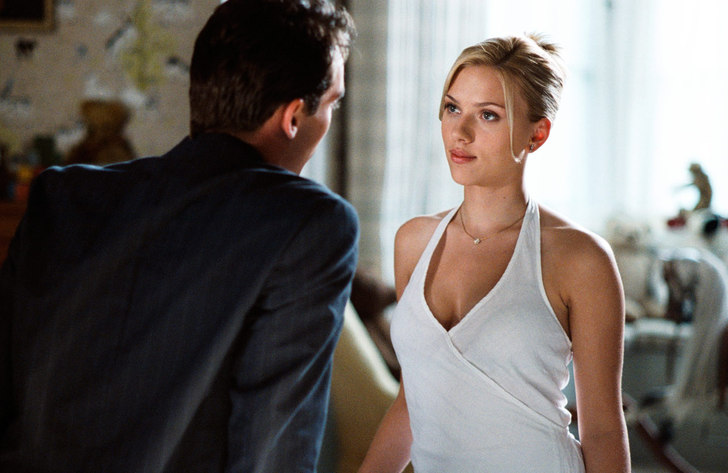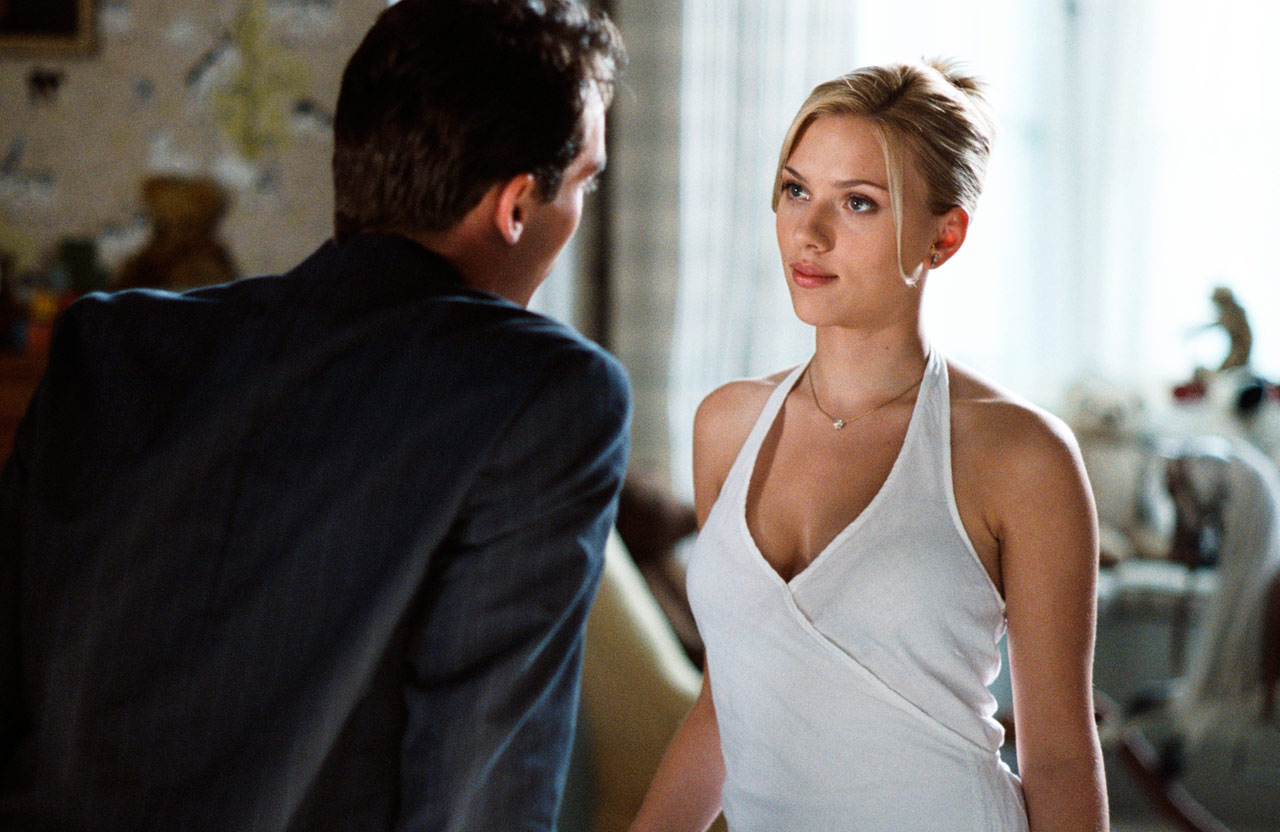Match Point
 You get almost 1000 hits when you run a Google search for "match point" woody departure, about 990 more than you get when you search "match point" woody "same old shit". That's a good thing, even if Woody Allen's newest film is less of a change-up than the PR suggests. It really has the old man's fingerprints all over it. The main thing in Allen's career right now that it's a departure from is sucking.
You get almost 1000 hits when you run a Google search for "match point" woody departure, about 990 more than you get when you search "match point" woody "same old shit". That's a good thing, even if Woody Allen's newest film is less of a change-up than the PR suggests. It really has the old man's fingerprints all over it. The main thing in Allen's career right now that it's a departure from is sucking.
Yes, Match Point represents a pretty dramatic recovery -- if he's not in top form, at least Allen has his bearings back. This is a black comedy without a laugh track, a small drama without cuteness, a wry morality play where the jokes aren't in evidence until the film's very last scenes, when Allen not only reminds us, as he did in Crimes and Misdemeanors, that God doesn't exist, but posits that He has a really sick sense of humor. (That's another critical rap on Match Point, by the way, that it's too similar to Crimes and Misdemeanors. If I were Woody Allen, that's a criticism I could definitely live with.)
Allen doesn't appear in Match Point, of course, and there is, mercifully, no obvious Allen surrogate to be seen. Instead, the protagonist is Chris Wilton (Jonathan Rhys-Meyers), an Irish tennis protégé turned buttoned-down London businessman with a bright future as one of his father-in-law's corporate minions. Despite an adorable wife (the great Emily Mortimer) and a high-rent flat with a lovely view (the New York audience I saw it with cracked the fuck up when they got a load of the ridiculous panorama visible from this couple's apartment), he really wants to bone Nola (Scarlett Johannson), a struggling blonde actress with lips that won't quit, an ass like that, etc. Given that he owes his newly plush station in life entirely to the favor of his father-in-law, who has embraced him largely because his presence in her life makes his daughter happy, Chris's failure to keep his dick in his pants poses a dilemma of more-than-philosophical proportions.
At its heart, Match Point is a story about class -- about how you start to think differently about relationships, family and otherwise, when your station in life is on the rise, and how the life to which you grow accustomed both limits your options and makes you capable of a boldness, even a sadism, that you might not have thought you had in ya. It's also a Darwinist joke, a long set-up followed by a punchline having to do with what kind of couples have babies and what kind of couples do not. And, yes, it's a sour-old-man's movie, bitterly observed and regarding the very concept of love with some suspicion.
Alas, it's also more than two hours long, and Woody Allen in top form has never been a maker of long movies. Something about his 2002 effort, Hollywood Ending, tweaked me to the notion that what's crucially missing from his latest films is a ruthless editorial sensibility. Match Point is a generally elegant but occasionally unwieldy film. A few lines of dialogue are clunkers, and some of the performances are uneven. As I watched it, I wanted to wish away the dull or distracting moments -- to trim the head of this conversation, to cut to the chase in this sequence, to get rid of that expository dialogue that you don't need anyway. I can't help but think that if Allen's editor Alisa Lepselter, who he's been working with since 1999, would rule his cutting room with an iron fist, his recent movies would be about 20 percent shorter and maybe 50 percent better.
Scarlett Johanson's performance here is a case in point. At her best, I think she's pretty awesome -- she did exactly what she needed to do, mixing a blunt, honey-dripping foxiness with an essential vulnerability and a sense of almost existential terror at the idea that she would let herself get plowed by a cute face, a kind word and a long line of bullshit. There's a kind of naturalism to her performance here that's hard for actresses to get at, and that Allen seems unusually good at coaxing out of them. In short, she's terrific. But there's an occasional inconsistency, too, that's off-putting, drawing too much attention to the artifice at work. Could a few more editorial nips and tucks satisfactorily elide her missteps? Maybe. And this is a film that feels flabby.
In many regards, though, Lepselter's work is spot-on. Weeks, months and years whip past in quick narrative succession, and she manages never to draw attention to the cuts or to congratulate the film on the elegance of its construction. There's a real elegance, too, to the cinematography (this Remi Adefarasin guy is, I think, underrated), and the way Lepselter cuts from beautiful close-up to close-up. Maybe it's Allen's received European-master medium-shot style that makes the difference, but there's something about the close-ups in this film that just feel startlingly like close-ups, old-school Hollywood style. And almost everyone here looks really wonderful. It's well worth seeing on a proper screen.
The film's third act is a bit problematic in that Allen doesn't
seem to have done the legwork in earlier reels that would set up the
sudden dramatic event that defines the last long section of the film -- how
would this particular character be in any way capable of taking this
particular action? But maybe that's
the point -- that upper-class creature comforts make men capable
of brutishly mechanistic actions. What saves the film in any event
is its sudden, surprising turn toward the comic, as Allen plays a cat-and-mouse
game with audience expectations. Is there or isn't there any
such thing as cosmic justice? Well, this is a Woody Allen movie after
all. His best trick here is making you wonder if he's gone soft,
right before he lowers the boom. It's not a great
film, but I'll settle for what it is -- a very comfortable
and oddly comforting film from a sporadically great filmmaker. B+
 Match Point" title="Still from
Match Point" title="Still from 